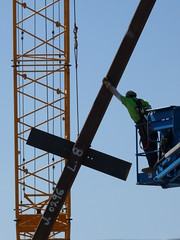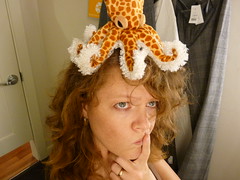"Go not gently into that dark night", said Dylan Thomas. He was speaking of his own death, but I think it applies to the age in which we live.
The 'Old' is dying a difficult, messy, loud death. The 'Old' is taking the line "Rage, rage against the dying of the light" very much to heart.
It is all around us- Somalia, Sudan, Congo, Palestine, Israel, Iran , Iraq, Afghanistan, Georgia, Russia, Wall Street, Main Street. Everything we have known has taken a different turn and the consequences are in the headlines daily. Pirates, crooks, wars, bombings, fundamentalists, conservatism, bank failures,ponzi schemes, water shortages... sounds like it is time for the militias, doesn't it?
These are the death throws of the Old World. Just like a small child who is presented with too much change in too short a period of time will throw a tantrum, the world is screaming and stomping and raging.
I started thinking about this today, not because of horrific headlines in the news, but because of an online discussion about the changes coming to my neighborhood. My neighborhood has changed mightily since it exploded on to the scene as a place to provide emergency housing following the 1906 Earthquake. We have way more people and cars and poorly planned space than anyone could have imagined 50 years ago. In response, it has become time to change the way we drive, park our cars, build our homes, and encourage business to come to our little corner of San Francisco. Many who live here, want things to change so that there can be more room for children to play and people to walk and bikes to ride, but there are many who view change as personally threatening. They are usually quite loud about their fear. That noise can frequently slow progress.
There are three really hot button topics here. Bicycle lanes, dogs and freeway access. Any of these can cause hours of nonproductive mud slinging. Decades ago, San Francisco had a plan for freeways that circled the city. In theory, they would keep car traffic off the streets and give access to all corners of our difficult to negotiate city. No one was ever really able to say if it was a good plan or not- construction was never finished and the 1989Loma Prieta Earthquake damaged most of it beyond repair. As a result, several streets in SF were then designated to be the arterials between the 4 compass points, and my street is one of those. At the time I doubt the powers that be gave much thought to the impact that turning these streets into highways would be on the people who lived there. Now, the residents of these places are starting to fight back, and those who have reaped the rewards of these outdated plans are complaining loudly. The ideas of slowing traffic, redirecting flow, and providing multi modal space for buses, bikes, cars and pedestrians is too much for some people. Many fight the increase in housing that needs to occur on the basis that there is not enough parking for them! One argument about improving pedestrian safety outside the local Junior College is that it would slow people down on their way to the freeway.
I am fascinated by fear of change. This is not something I am generally plagued by. Sure, I get nervous about things that come at me, from time to time, I am a regular everyday person, after all. The kind of fear I am talking about here, is the kind that keeps humans from moving on with having a better life. There is something about change that brings us forward that terrifies people. Conversely, many seem really happy with the kind of change that makes us less human and more robot (the Patriot Acts come to mind). My theory is that this all has to do with the illusion of control and our desire to keep the planets moving in the orbits we set for them.
What do you think? Why do we block change? Do we gain anything by it?
Sunday, April 26, 2009
Subscribe to:
Post Comments (Atom)






2 comments:
I wonder if it is really fear itself of change or really fear (and loathing) that I am among a large number of people who are being asked to change in order to preserve the priviledge of a few. And I speak not exclusively of the priviledge of a few at the top but of a few at the bottom as well as we are being forced to adapt and give up to provide care and resources to people who should not even be here. At least the few at the top pay for what they take. I, and millions of others like me, pay increasingly more and more for the few at the bottom and I don't like it any more. I don't mind taking care of our own who need, but there is a limit to our ability to be the chumps to people who are basically freeloaders. And approaching that limit is a large part of what is forcing a change I do not like.
I am not sure what you mean, anonymous. People "who do not even belong here"? Where is here? What is a "freeloader"?
Within the teachings that I study, we are all the same, the "freeloader" and "me" are the same. If this is true, the who does not belong?
Within the teachings of the Big 3 Judeo-Christian beliefs, we should love our brothers as we do our selves. So, again, who does not belong?
Modern societal psychology would suggest that the "freeloaders" are simply a product of what has been before them. Very similar to Buddhist teachings that state that we are the product of the aggregate circumstances of the Universe to this point. So how do we exclude those who are the product of situations beyond their control?
Such puzzling questions.
Post a Comment